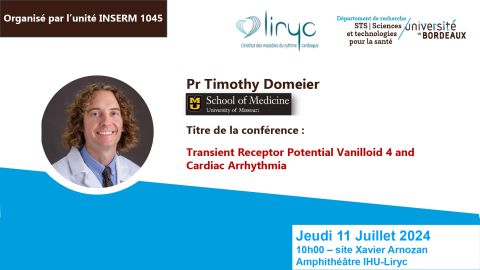We are pleased to announce a special lecture by Professor Timothy Domeier, a renowned expert in cardiac field and authority of TRPV4 channels.
Professor Domeier's lecture, titled "Transient Receptor Potential Vanilloid 4 and Cardiac Arrhythmia" promises to offer invaluable insights into the role of the TRPV4 channel in the pathophysiology of cardiac electrical activity, function and arrhythmogenesis.
This is a unique opportunity for students, researchers and clinicians to engage with a leading expert in the field and gain a deeper understanding of this emerging and promising area of cardiovascular research.
Date: July 11, 2024
Time: 10h00
Speaker: Pr Timothy Domeier
Venue: IHU Liryc amphitheatre
Address: Av. du Haut Lévêque, 33600 Pessac
Title: Transient Receptor Potential Vanilloid 4 and Cardiac Arrhythmia
Contact
Sébastien Chaigne : sebastien.chaigne@ihu-liryc.fr
Pr. Timothy Domeier Presentation
Tim Domeier is currently an Associate Professor and Margaret Proctor Mulligan Endowed Professor at the University of Missouri, and is Principal Investigator of the Cardiac Cell Physiology Laboratory.
Tim obtained a BS degree from the University of Nebraska and PhD from Yale University, followed by postdoctoral training at Loyola University Chicago and Rush University.
The Cardiac Cell Physiology Laboratory investigates the inter-relationships between stretch of cardiac myocytes, aberrant calcium regulation, and arrhythmia with aging, genetic cardiomyopathy, heart failure, hypertrophy, and muscular dystrophy. The laboratory identified increased expression of the Transient Receptor Potential Vanilloid-4 (TRPV4) ion channel in cardiac myocytes with aging, and ongoing research in the laboratory examines the pathological role of TRPV4 in the setting of ischemia-reperfusion injury, neurohormonal excess, atrial fibrillation, and pulmonary hypertension.
Research in the laboratory has been continually supported by F, K, and R-level funding from the United States National Institutes of Health, as well as the American Heart Association.


